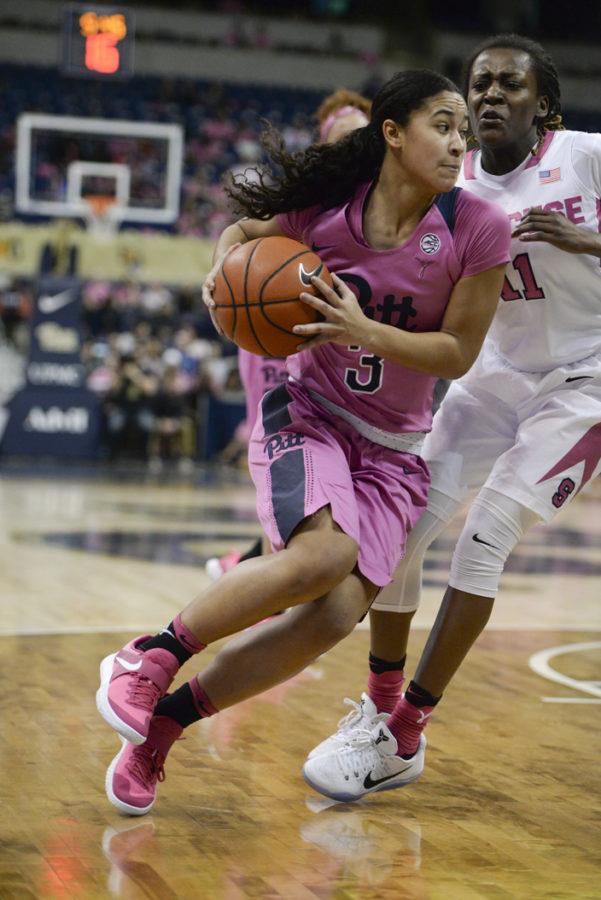Around the time North Carolina guard Jamie Cherry buried her fifth 3-pointer of the game in the first round of the 2017 ACC Tournament, the Pitt women’s basketball team was starting to realize its season was over.
The Panthers ended the regular season with a 13-16 overall record and a 4-12 record in ACC play, giving them the No. 11 seed in the ACC Tournament. But they failed to make it out of the first round, losing to Cherry’s No. 14 Tar Heels — the same team they defeated in the first round of last year’s tournament and the same team they beat by 20 earlier this year.
Cherry’s 32-point barrage would have been tough for any team to overcome, but this Pitt team had multiples holes it needed to address in order to return to its winning ways.
The loss ended the Panthers’ season at 13-17 overall — nearly identical to the team’s 13-18 record in 2015-16 — only two years removed from a 20-win season and NCAA Tournament run in Suzie McConnell-Serio’s second year as head coach.
So what went wrong? Why has the team struggled through back-to-back losing seasons without much improvement?
The absence of one of the team’s best players — junior forward Yacine Diop — is a good place to start. Diop missed the entire 2016-17 season with a stress fracture in her foot.
In her first two years with the Panthers, Diop started every game. The Senegal native contributed 9.4 points per game in her first year, making her the third-highest-scoring player on the team. As a sophomore, Diop raised her average to 10.4 points per game, putting her just behind sophomore forward Brenna Wise as the team’s second-leading scorer.
Without Diop’s services, Wise had to assume full responsibility as Pitt’s go-to playmaker on offense.
A local product of Vincentian Academy, Wise continued to be a powerhouse as a sophomore, as she again led the team in scoring and rebounding with 14.3 points and 6.3 rebounds per game.
Wise tallied a career-high 26 points in Pitt’s 62-54 win over Virginia Jan. 22, then surpassed that effort with 31 points while setting a new school record of 13-for-13 shooting from the free throw line in the Panthers’ 72-64 win over Virginia Tech Feb. 16.
But Wise couldn’t do it all. She received help from some new teammates this year but will need even more of it in the future.
McConnell-Serio brought on three new players in 2016-17: True freshmen guards Alayna Gribble and Jasmine Whitney and graduate transfer center Brandi Harvey-Carr from DePaul. All three newcomers made key contributions.
Gribble quickly established herself as a shooting threat from beyond the arc. Opposing benches shouted out, “Shooter!” every time she touched the ball. She battled through an early-season injury to come on late — draining a career-high seven 3-pointers in a 93-65 loss vs. Syracuse Feb. 2 — and finished her first year with 6.7 points per game and a team-high 46 3-pointers.
McConnell-Serio turned to Whitney — a 5-foot-9 point guard — to run the team’s offense in her first year. She earned her coach’s trust before the season, prompting McConnell-Serio to give her a starting spot even with an established point guard returning in junior Aysia Bugg.
Although the two shared the role during the season, Whitney was the team’s primary ball handler and played with the poise and confidence of a veteran rather than a first-year guard. She finished her debut season averaging 6.1 points, 3.6 rebounds and a team-best 3.3 assists per game.
Harvey-Carr, a 6-foot-4 center with a soft shooting touch, brought the team the height it so desperately needed following the offseason transfer of 6-foot-2 starting center Stasha Carey.
Carey averaged 9.7 points, 6.8 rebounds and 1.5 blocks per game as a sophomore before transferring to Rutgers, and Harvey-Carr nearly mirrored her production. She finished the 2016-17 season with 9.6 points, 4.7 rebounds and one block per game.
Gribble and Whitney still have three years to grow and improve, but the Panthers will now have to look for a new center for the third year in a row to replace Harvey-Carr.
With Wise, Gribble, Whitney and Diop — assuming she returns to full health — set to make up the team’s nucleus next season, Pitt only needs a few more pieces to make a push to get back to the NCAA Tournament. One of those role players might already be here in sophomore forward Kauai Bradley.
After a quiet debut season, Bradley was arguably the team’s most improved player as a sophomore, becoming a regular starter, a stingy defender and a solid 3-point threat.
Bradley quadrupled her first-year scoring average in 2016-17, raising it from 1.6 to 6.4 points per game. She recorded a career-high 17 points in the Panthers’ regular season win over UNC, and also led Pitt in scoring with 12 points against the Tar Heels in the first round of the ACC Tournament.
For the Panthers to compete in the loaded ACC next year and beyond, they’ll need Bradley, Gribble and Whitney to continue to develop, Diop to return to form and more of the same from Wise.


